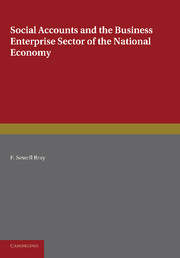Book contents
- Frontmatter
- Contents
- PREFACE
- I The double-entry system and its purpose
- II The originating structure of accounts
- III The originating reconciliations
- IV The primary reconciliations
- V The opening and closing circulating capital funds
- VI The balancing statement
- VII The system of accounts
- VIII An explanation of the items in the system of accounts
- IX The sector balance sheets
- X Glossary of terms
- Appendix I A further note on provisions for depreciation and obsolescence
- Appendix II A further note on inventories
- Appendix III Social accounting. Suggested form of business enterprise primary accounting return
I - The double-entry system and its purpose
Published online by Cambridge University Press: 05 June 2016
- Frontmatter
- Contents
- PREFACE
- I The double-entry system and its purpose
- II The originating structure of accounts
- III The originating reconciliations
- IV The primary reconciliations
- V The opening and closing circulating capital funds
- VI The balancing statement
- VII The system of accounts
- VIII An explanation of the items in the system of accounts
- IX The sector balance sheets
- X Glossary of terms
- Appendix I A further note on provisions for depreciation and obsolescence
- Appendix II A further note on inventories
- Appendix III Social accounting. Suggested form of business enterprise primary accounting return
Summary
The basis of the double-entry system of social accounts for the business enterprise sector of the national economy which is here put forward, is to be found in ‘A Working System of Social Accounting’, a study which forms part of Mr Richard Stone's memorandum on the subject of ‘Definition and Measurement of the National Income and Related Totals’. This memorandum was included as the appendix to the Report of the Sub-Committee on National Income Statistics of the League of Nations Committee of Statistical Experts.
The originating structure of accounts is set out in the second section of this book, and it will be clear to both accountants and business men that it reveals a grasp of double-entry account keeping principles. Accordingly, it should not prove a difficult matter to reset this originating structure in a form reasonably consistent with and acceptable to current accounting practice.
At this point it is worth while recalling some comments of Mr G. O. May, a leading American accounting authority. Writing on the uses of accounts with particular reference to concepts of income he made it clear that
…double-entry accounting supplies a check which is invaluable. Industrial experience has repeatedly demonstrated the dangers inherent in computations of costs or profits which are not so tied in with the financial accounts as to insure that all costs have been allocated in one way or another. Today, such integration is recognised as indispensable to the establishment of reliable factual bases for policies and actions.
There he reveals the statistical check which double-entry financial accounting documents do portray. Each recorded originating transaction must have its counterpart somewhere in this system, only thus do we see the mutual interdependence of otherwise economically distinct transactions. Mr G. O. May goes on to say that
The importance of this point and its wide applicability are apparent to anyone who has examined with care the purely statistical information in regard to the so-called national income and savings that has been officially disseminated, including that presented by distinguished economists in testimony before the Temporary National Economic Committee or in monographs published under the auspices of that body. If such material had always been the product of a rigorous system of double-entry accounting, many fallacies and unwarranted conclusions would have been avoided.
- Type
- Chapter
- Information
- Publisher: Cambridge University PressPrint publication year: 2013



